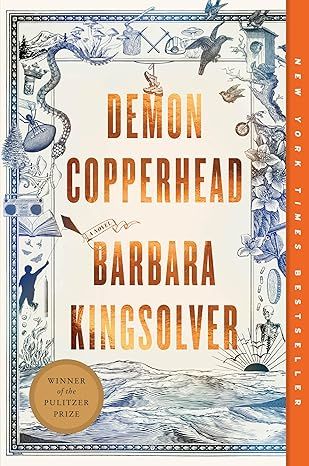Demon Copperhead: A Novel
4.6 out of 5
110,129 global ratings
WINNER OF THE PULITZER PRIZE • WINNER OF THE WOMEN'S PRIZE FOR FICTION
New York Times Readers’ Pick: Top 100 Books of the 21st Century • An Oprah’s Book Club Selection • An Instant New York Times Bestseller • An Instant Wall Street Journal Bestseller • A #1 Washington Post Bestseller • A New York Times "Ten Best Books of the Year"
"Demon is a voice for the ages—akin to Huck Finn or Holden Caulfield—only even more resilient.” —Beth Macy, author of Dopesick
"May be the best novel of [the year]. . . . Equal parts hilarious and heartbreaking, this is the story of an irrepressible boy nobody wants, but readers will love.” —Ron Charles, Washington Post
From the acclaimed author of The Poisonwood Bible and The Bean Trees, a brilliant novel that enthralls, compels, and captures the heart as it evokes a young hero’s unforgettable journey to maturity
Set in the mountains of southern Appalachia, Demon Copperhead is the story of a boy born to a teenaged single mother in a single-wide trailer, with no assets beyond his dead father’s good looks and copper-colored hair, a caustic wit, and a fierce talent for survival. Relayed in his own unsparing voice, Demon braves the modern perils of foster care, child labor, derelict schools, athletic success, addiction, disastrous loves, and crushing losses. Through all of it, he reckons with his own invisibility in a popular culture where even the superheroes have abandoned rural people in favor of cities.
Many generations ago, Charles Dickens wrote David Copperfield from his experience as a survivor of institutional poverty and its damages to children in his society. Those problems have yet to be solved in ours. Dickens is not a prerequisite for readers of this novel, but he provided its inspiration. In transposing a Victorian epic novel to the contemporary American South, Barbara Kingsolver enlists Dickens’ anger and compassion, and above all, his faith in the transformative powers of a good story. Demon Copperhead speaks for a new generation of lost boys, and all those born into beautiful, cursed places they can’t imagine leaving behind.
560 pages,
Kindle
Audiobook
Hardcover
Paperback
Audio CD
First published August 26, 2024
ISBN 9780063251984
About the authors
Barbara Kingsolver
Barbara Kingsolver was born in 1955 and grew up in rural Kentucky. She earned degrees in biology from DePauw University and the University of Arizona, and has worked as a freelance writer and author since 1985. At various times she has lived in England, France, and the Canary Islands, and has worked in Europe, Africa, Asia, Mexico, and South America. She spent two decades in Tucson, Arizona, before moving to southwestern Virginia where she currently resides.
Her books, in order of publication, are: The Bean Trees (1988), Homeland (1989), Holding the Line: Women in the Great Arizona Mine Strike (1989), Animal Dreams (1990), Another America (1992), Pigs in Heaven (1993), High Tide in Tucson (1995), The Poisonwood Bible (1998), Prodigal Summer (2000), Small Wonder (2002), Last Stand: America's Virgin Lands, with photographer Annie Griffiths (2002), Animal, Vegetable, Miracle: A Year of Food Life (2007), The Lacuna (2009), Flight Behavior (2012), Unsheltered (2018), How To Fly (In 10,000 Easy Lessons) (2020), Demon Copperhead (2022), and coauthored with Lily Kingsolver, Coyote's Wild Home (2023). She served as editor for Best American Short Stories 2001.
Read more
Reviews
Diana H. Maine
5
Good Title
Reviewed in the United States on August 4, 2024
Verified Purchase
Demon Copperhead is written by Barbara Kinsolver. She is an accomplished and award-winning author. Also very popular. In 2022, the New York Times Book Review listed Demon Copperhead as one of the year’s 10 best books. “ Set in the mountains of Appalachia, Demon Copperhead is the story of a boy born to a teenaged, single mother in a single-wide trailer with no assets beyond his dead father’s good looks and copper-colored hair, a caustic wit and a fierce talent for survival.” Demon survives the perils of foster care (just barely survives), child labor, derelict schools, athletic success, addiction, abject cruelty, and desertion. Charles Dickens wrote David Copperfield, highlighting his experiences as a survivor of institutional poverty and its damage to children in his society. These same problems and purposeful cruelty are yet to be solved in modern times.
The writing, to be expected, is brilliant. It could pass as a treatise in a Sociology class. It was so very difficult for me to read though. I had difficulty finishing the book. Anger, frustration and disgust were the emotions I experienced while reading. It was a brutal, portrayal of Appalachian culture (if one can call it that).
Read more
Ga303
5
Easily one of the best books I read this year.
Reviewed in the United States on December 1, 2023
Verified Purchase
"Demon Copperhead" kept and kept on appearing in my "suggested for you" on Kindle, and each time, I kept thinking "Ugh, not so much, I just want something to read, but not sure if I really feel like turning on my thinking cap for Barbara Kingsolver." Finally, largely out of self-defense as I was so tired of seeing it, I caved and got the book. When I look back on all that I have read this year, or even over the past couple to few years, I can't imagine not having read it.
This book has been called a creative retelling of "David Copperfield." As to that, I will begin by saying not "I was born," but something far more provocative: I don't like Dickens. Sorry, I don't, despite having taken (or possibly because of having taken) an entire Senior English Seminar on his works in college. In that semester-long class, I was exposed to most of everything he'd written, including "David Copperfield," and did what I had to do to participate in classroom discussion and achieve a grade. Shortly after that, I largely forgot "David Copperfield" and its characters or situations, so I read "Demon Copperhead" cover-to-cover without recognizing the parallels. It wasn't until after I finished the book and took a quick trip to Wikipedia that I saw how creatively these were done, from plot events to character names, and was impressed. (And for those reviewers who have said this is "plagiarism," no, a retelling of an existing story is not plagiarism.)
Rather than Dickens' coal-choked, vice-ridden, poverty-stricken 19th century London, the setting has been transported here to Appalachian Virginia, more or less in the present day. The titular character's surroundings are beautifully done, as Kingsolver's descriptions always are, and the reader is immediately immersed in his life's adventures and misadventures, from young childhood to young adulthood.
I found the narrative voice of his childhood to be particularly effective. A child's perceptions of his world, however intuitive, are often incorrect or entirely made up based on emotions such as love or fear. Child Demon's voice felt very believable to me (and many times was cause for a chuckle, a chuckle not being easy to come by in a story with as many dark themes as this one has). From there, it is interesting to read a gifted writer changing the narrative voice as the character gets older.
As always, always, always (and my favorite attribute of Barbara Kingsolver's writing), the descriptions of nature are wonderful and meticulously detailed, especially as seen through the perception of a child. (In one example, the character Maggot is observed by Demon to be holding a tiny, tiny grasshopper, so small it seemed to have come from "a planet of smaller things.")
In being with Demon from childhood into young adulthood, we see a character who goes from fearing Boogeymen which live largely in his imagination to confronting Boogeymen which are real -- in this case poverty, the flaws of the foster care system, the manipulation of the people of this region by big business and government, and the horrors of the opioid crisis.
I came across a number of reviews from readers who felt the depiction of the latter was one-sided and had very strong opinions about it -- I'm not here to debate that -- or that the themes of the book were too heavy-handed. And granted, while many (self included) believe that some of Barbara's Kingsolver's books are too heavy-handed in terms of social or ecological agendas, I felt this was much more subtle in "Demon Copperhead" and did not find the themes overbearing at all -- possibly because the reader is experiencing things through the eyes of a very well-developed character, rather than through the words or actions of less-developed characters in some of her other books where characters feel like devices and not people.
Some say Dickens beat readers over the head with themes, too. Much as he may not be my favorite writer, however, I feel that he did a good enough job of creating a world and characters that he didn't have to beat anyone over the head with anything. I feel Kingsolver has achieved that here, too. Understanding the ugliness of a society as perceived by a believable character -- and feeling sad, appalled, ashamed, what-have-you -- is not the same as being hit over the head by something.
There's some dark, dark stuff here, so fair warning: readers who aren't prepared for that had best pick up another selection. And if this isn't your cup of tea, please do that rather than drag down reviews of this one with expressions of shock about the "trash" herein. Things like sex, death by OD, people shooting up, etc., are part of this story.
As others have said, however, I am flabbergasted by the fact that Amazon's age suggestion for this book is "ages 9 and up." While there may be 9-year-olds at a reading level sufficient to comprehend the words, this book is not kid stuff.
While a 70% five-star rating is a suggestion of the widespread appreciation for "Demon Copperhead," there are, as always, other percentages of readers who liked it less or even hated it (which is the beauty of the right to freely express an opinion, or to admit that something is simply not to one's taste).
If I had a nickel for every review that said this was a horrible book or a suggestion that Kingsolver has fallen off her game and ended by saying "Go read 'The Poisonwood Bible'," I'd be a rich reader indeed.
I'll end by saying I did "go read 'The Poisonwood Bible'." (Twice, actually, well before reading this one.) And this reader liked "Demon Copperhead" way better.
Read more
159 people found this helpful
susan
5
POWERFUL! Depressing, energizing, totally engrossing.
Reviewed in the United States on July 9, 2024
Verified Purchase
Demon Copperhead is without a doubt the most powerful novel I've read in 25 years. Or more. (I read 20-30 novels a year, minimum. I devour good literature.) Yes, Kingsolver modeled her blockbuster novel after David Copperfield, BUT I declare her the TOLSTOY of our modern age. She's far beyond Dickens, who was great, of course, but not one of the world's finest writers, by any means. Tolstoy, on the other hand, is way up there. And Kingsolver is way, way up there. This is some of the finest writing I've ever read. Kingsolver's understanding of human emotion and human attachment, and her ability to capture these, is beyond fabulous, Her grasp of the sweep of history behind her characters, and within her characters, creates a depth not found elsewhere. Her depiction of people bound to each other, to their community, to the earth, to a way of life they will never escape—nor want to—is her gift to humanity. Appalachia is a world unto itself, and yet it is a world we can (and should) all identify with, a world where people care for each other and are bound to each other by love, by need, by experience, by joys and sorrows. By human experience. This is a book of nightmares. And of wild-eyed dreams. Of far-flung expectations, and deep hope. Tolstoyan, at its best. This is a book for the ages. It will be as relevant in 2124 and 2224 as it is now. This book should be assigned to every single junior in high school. This is the book that promises to grab every young person and never let go.
Read more
25 people found this helpful
Weinbrain
5
Moving, funny, unstoppably absorbing
Reviewed in the United States on June 25, 2024
Verified Purchase
DEMON COPPERHEAD delighted, engaged, educated, depressed and hooked me beyond all my expectations. I was especially open to learning about this part of America because I recently spent a week near Roanoke VA at a family wedding. I saw nothing on that trip of the world in this book except the good parts of Virginia that the protagonist sold me on. I was already offended on behalf of Appalachia in terms of how most media deride its citizens and mock them. Now I feel a kinship. Beyond that I feel inspired to read outstanding and engaging fiction again — and, as a somewhat lapsed fiction writer, inspired to write it. I cried; I was moved and surprised and also vindicated by plot twists I’d hope would play out. I laughed and had my mind opened. A deeply real and life-affirming journey. My first Kingsolver but not my last!
Read more
2 people found this helpful
Amazon Customer
5
Outstanding
Reviewed in the United States on July 15, 2024
Verified Purchase
I consider this one of the best books I have ever read. Her descriptions, her insights, her love and appreciation for the Appalachian people comes through on every page. Not since I read Catcher in the Rye as a teenager have I found a book with such perfect insight into teenage boy's ideas and motivations. She's a woman who seems to somehow understand a young man's inner life. It was amazing. She is an outstanding writer. I believe that this book will stay with me and influence me in subtle ways for the rest of my life. There’s a good reason why it won the Pulitzer Prize.
Read more
ReadsALot
5
A Vivid Tale of Resilience: Demon Copperhead with a Caveat
Reviewed in the United States on May 28, 2024
Verified Purchase
Barbara Kingsolver's Demon Copperhead, a modern take on Charles Dickens' David Copperfield, is a powerful and evocative novel. While the story resonated with me on a personal level, I do want to address a potential drawback for some readers.
Strengths:
Vivid Setting and Characters: Kingsolver's Appalachia is beautifully rendered, transporting you to the heart of this rural community. The characters, especially Demon Copperhead himself, are well-developed and memorable. You'll find yourself invested in their struggles and triumphs.
Modern Twist on a Classic: Fans of Dickens' David Copperfield will appreciate the familiar themes and plot points, reimagined for a contemporary setting. It's a fresh take on a beloved story.
Powerful Exploration of Social Issues: Kingsolver tackles relevant issues like poverty, addiction, and the struggles of the working class. It's a thought-provoking read that sheds light on the challenges faced by many in America today.
A Note on Content:
Mature Content: It's important to acknowledge that the book contains some sexual content that might be inappropriate for younger readers or readers who prefer to avoid such material. While these scenes contribute to the overall story, they might be off-putting for some. Overall Recommendation:
If you're looking for a well-written story with a strong sense of place and relatable characters, then Demon Copperhead is definitely worth considering. However, be mindful of the mature content if that's a concern for you. Despite the caveat, Kingsolver's beautiful prose and exploration of social issues make this a compelling read for many.
Read more
9 people found this helpful
Jay Ruud
5
More than a Dickens rewrite
Reviewed in the United States on March 20, 2023
Verified Purchase
When, at the age of 15, I first read David Copperfield, Charles Dickens’ classic novel of the protagonist’s struggle to rise above child poverty in a society seemingly structured to keep him poor, it was the first book that made me tear up at the end, that glorious end with the angelic Agnes ever “pointing upward.” I wasn’t sure that Barbara Kingsolver’s DemonCopperhead could possibly elicit anything like that response from my jaded, seen-it-all-before, read-it-all-before consciousness. Re-imagining the quintessentially British Dickens’ nineteenth-century story as a twenty-first century slice of American Appalachian life? How’s that likely to work?
Well, of course, it was likely to bomb spectacularly. But instead, what I found from the book’s very first paragraph was a voice that explodes off the page with both confidence and world-weariness, with stoicism and self-knowledge, with everything the character is going to exhibit in the rest of this blockbuster of a novel.
Dickens’ David famously opens with, “Whether I shall turn out to be the hero of my own life, or whether that station will be held by anybody else, these pages must show.” By contrast, Kingsolver’s Copperhead (whose real name is Damon Fields, but he has red hair, so…) opens with, “First, I got myself born. A decent crowd was on hand to watch and they’ve always given me that much: the worst of the job was up to me, my mother being let’s just say out of it.”
In this life, you make your own choices, and if you’re going to get anywhere, and your mother is in and out of rehab constantly, you have to do it yourself, Damon tells you at the beginning. You think there’s going to be a hero in your life? Think again. There’s just you, trying to make your way in a world that’s stacked against you. Here’s a voice that, in its tone of genuine down-home rural Americanism sounds a lot more like Huck Finn than anybody in Dickens. Like Huck, he has a memorable way of putting things in his colorful American vernacular: He’s “the Eagle Scout of trailer trash,” he tells us at one point.
And I don’t mean to say that you must be familiar with David Copperfield to enjoy Demon Copperhead. You can follow the plot, empathize with the characters and absorb the themes of Kingsolver’s book without ever having heard of Dickens. But it does add something to the overall experience of the book if you know the Copperfield story. In particular, there’s a bit of fun for readers when they can recognize by name a Kingsolvian character intended to parallel a Dickensian one. Thus, when Damon’s abusive stepfather bears the name of “Stoner,” it’s easy to see the connection with David’s equally cruel stepfather, whose name happens to be “Murdstone.” Damon’s kind neighbors, the Peggots, clearly recall David’s friends the Peggottys and Clara Peggoty, David’s early nurse and lifelong friend. Dickens’ charming and narcissistic James Steerforth, who for a while promises to be that “hero of my own life” David looks forward to in his opening sentence, finds his counterpoint in Kingsolver’s Sterling Ford, nicknamed Fast Forward, star quarterback on the high school football team and, for awhile, Damon’s idol. Copperfield’s “child wife” Dora Spenlowe is echoed in Kingsolver’s Dori, and when Damon falls for his needy, childish Dori you don’t have to remember David Copperfield to know that relationship is going to be a disaster, but it helps.
Occasionally Kingsolver’s parallel characters are direct mirror images of Dickens’, as in the case of Damon’s grandmother Betsy and her eccentric friend Mr. Dick, who liked flying kites, mirroring David’s great-aunt Betsy and her eccentric friend Mr. Dick who also liked flying kites. Sometimes there’s more of a difference: Damon’s short-term foster father Mr. McCobb has a few things in common with David’s Mr. Micawber, lack of steady employment and perpetual new schemes to get rich among them, but Micawber is a well-meaning screwup, while McCobb is just trying to take advantage of the system. And Dickens’ Uriah Heep is a far more insidious villain than Kingsolver’s assistant coach U-Haul Pyles, whose downfall is far less precipitous than Heep’s in Dickens. And then there is “Angus” Winfield, daughter of the high school football coach and Damon’s foster-sister during the best and worst years of his life, who clearly parallels David’s guardian angel, Agnes Wickfield, and who you know from the first is going to be a major influence in Damon’s life. Of course, knowing Dickens gives you an idea of the role these characters are going to play in the story. But the plot of Demon Copperhead is not therefore predictable, as Kingsolver translates these characters’ motivations and effects on the protagonist into a completely different milieu of time and place. Ultimately, what’s important about the influence of Dickens on Kingsolver’s book is not the superficial correspondences of plot or character, but rather their very significant agreement in terms of theme and authorial intent. In an afterword to her novel, Kingsolver writes, “I’m grateful to Charles Dickens for writing David Copperfield, his impassioned critique of institutional poverty and its damaging effects on children in his society. Those problems are still with us. In adapting his novel to my own place and time, working for years with his outrage, inventiveness, and empathy at my elbow, I’ve come to think of him as my genius friend.”
It is precisely those social evils that Kingsolver has directly in her sites in this novel: The institutional poverty of former coal-mining areas of her native Appalachia; the effects of that poverty on children, especially children whose parents have been victims of that poverty and are dead or imprisoned. She attacks the ineptitude and bureaucracy of child welfare services, the abuse of the system of foster care that allows people like Damon’s foster parents to take children solely for the sake of taking the monthly support money, or for gaining slave labor like the tobacco farmer who first fosters Damon. She attacks a justice system that will accept the testimony of an abusive stepfather rather than the word of the abused child.
But more than anything else she attacks the opioid crisis. Damon, who has a brief period when it seems he may escape the cesspool of his luckless life through success on the gridiron as a high school football star, has a terrible knee injury for which he is prescribed opioid pain relievers to which he becomes hopelessly addicted, and Kingsolver’s indictment of the doctors, salesmen, druggists, and especially the Sackler-owned Purdue Pharma are is merciless in the novel. It truly seems like there is no way out for Damon—but as David Copperfield had a talent in writing that finally helped pull him out of poverty, the fact that Damon has a talent for drawing—all he has left after football—does give him a ray of hope. I won’t spoil the end by telling you whether he’s able to use it.
Thus Kingsolver is not simply the heir of Dickens in recasting his most personal novel; she is more importantly the spiritual heir of Dickens’ novel of social criticism, something you don’t see much of any more. Where is Dickens today? Where are the Zolas? The Sinclair Lewises? The John Steinbecks? Gone. But we’ve still got Barbara Kingsolver.
Read more
334 people found this helpful
Mark Stevens
5
Copperhead Road
Reviewed in the United States on January 7, 2024
Verified Purchase
In an interview with Ezra Klein on his podcast, Barbara Kingsolver said she wanted to write “the great Appalachian novel.” She conceded, however, that the notion “probably sounds ridiculous.”
In particular, Kingsolver said she wanted to write about the fact that the people who live in Appalachia “are the most resourceful Americans you’re probably going to find anywhere.” Kingsolver, who was raised in rural Kentucky and now lives in rural Virginia, said she wanted to explore the shame she had internalized from her choice of a place to live.
“How many people well-meaning people have asked me, ‘how could I live there in the middle of nowhere?’” said Kingsolver. “People, this is my everywhere. This is my everything.”
Later in the chat: “Everybody looks down on the country people and the country people sort of absorb that. You can’t help but absorb it. So when I set out to write my great Appalachian novel. I was paralyzed with self-doubt because, I mean, my starting point was that I wanted to write about the opioid epidemic, which is become a huge assault on our culture, our families, our communities. It’s devastated so many of the good things about this region that we value and that we love. And so I wanted to write about these kids who’ve been damaged and this place that’s been damaged, and it seemed like a really hopelessly sad story. Plus, it’s about people that I didn’t feel the outer world cared about. And so I just really, I spent a couple of years walking around and around this story, trying to figure out how to break into that house because I really felt sure nobody wants to read it.”
Well, Kingsolver was wrong. At least, she was wrong about the interest in her topic—not her take on the people of Appalachia. Winner of the Pulitzer Prize for fiction and 85,000+ ratings on Amazon (4.6 stars).
There’s so much to like about Demon Copperhead but one of the main things is that it’s so breezily readable. For a 546-page epic, it goes down fast. It’s episodic, a la Dickens, but the character flow is organic, unforced. Demon’s voice is engaging and his struggles are real, particularly when it comes to the challenges of the foster care system and the brutality of OxyContin addictions. Kingsolver’s empathy for addicts comes pouring out of the story. She is non-judgmental, plays it straight.
Here is Demon, somewhat early on, looking back on the power of addiction: “I had roads to travel before I would know it’s not that simple, the dope versus the person you love. That a craving can ratchet itself up and up inside a body and a mind, at the same time that body’s strength for tolerating is favorite drug goes down and down. That the longer you’ve gone hurting between fixes, the higher the odds that you’ll reach too hard for the stars next time. That first big rush of relief could be your last. In the long run, that’s how I’ve come to picture Mom at the end: reaching as hard as her little body would stretch, trying to touch the blue sky, reaching for some peace.”
That’s as good a passage about the feeling of addiction, and a description of its power, that I’ve ever read. (Kingsolver also read that section on Klein’s podcast.)
Kingsolver is a deceiving writer. Her style is unassuming and keen-eyed. The text is full of specificity. And energy. If you have any doubts about tackling this book because it looks too heavy, squash those notions. Here’s the beginning of Chapter 34:
“A lot of firsts that school year. First scrimmage, first JV game, first tackle, first passing yards made. First school dance, with an eighth-grader girl that was dead serious about it. So, my first real date, evidently. Angus and Sax went together dressed as Planet of the Apes, loser of their grade contest (Sax) being the human on a leash. This is Homecoming mind you, not Halloween, so. Not a date. But Angus took mine over, ordered the corsage from Walmart, took me to Goodwill where we found this dope white suit from the sixties. In my size, unbelievable. I’ve grown into my hands and feet by this point, and I’m pushing 6 feet. Thank you, Mattie Kate.”
Mattie Kate is the housekeeper who worked for football Coach Wingate, where Demon lived while he was being developed as a potential football star. There are plenty of characters to keep track of, but Kingsolver gives them juicy nicknames (again, a la Dickens) or colorful descriptions so they are easy to track. U-Haul. Fast Forward. Waddles. Mouse. If you know David Copperfield (it’s been decades since I read it) you’ll have a great time with what Kingsolver did with her names. For instance, Uriah Heep becomes Ryan Pyles.
The “resourcefulness” of Demon is apparent in his stubborn ability to survive. He’s smarter than he acknowledges, and very observant. In Demon Copperhead, bad things happen to bad people and bad things happen to good people, too. Many around Demon are not so fortunate and literally or metaphorically drown. You can’t help but think about the failure of our institutions around child welfare, the foster care system, adult welfare, and drug abuse. But Demon finds his talent, develops a passion, and puts it to use. Hello, the power of art. And love. Every great novel, and this is one, is a love story in the end.
Demon Copperfield was written with passion for Kingsolver’s very personal reasons. The execution is a thing of beauty—and something we can all admire.
Read more
204 people found this helpful
Kindle Customer2
4
Heartbreaking & Fantastic
Reviewed in the United States on August 2, 2024
Verified Purchase
Title of Review: Heartbreaking & Fantastic Title: Demon Copperhead Author: Barbara Kingsolver Date Purchased: 14 June 2023 Amount Paid: $15.99 Page number: 556 pages Genre: Fiction, Contemporary, Literary Fiction, Coming of Age Date of Review: 29 July 2024 Winner of Pulitzer Prize for Fiction: 2023
This was a book I read for my local book club.
Set in the mountains of southern Appalachia, Demon Copperhead tells the story of a boy born to a teenage single mother in a single-wide trailer. With no assets beyond his deceased father's good looks and copper-colored hair, a sharp wit, and a fierce survival instinct, Demon navigates the modern challenges of foster care, child labor, failing schools, athletic success, addiction, disastrous loves, and devastating losses. Narrated in his own unflinching voice, Demon grapples with his invisibility in a culture that has largely abandoned rural communities. Inspired by Charles Dickens' David Copperfield, which drew from Dickens' own experiences with institutional poverty, Barbara Kingsolver transposes a Victorian epic to the contemporary American South. She channels Dickens' anger, compassion, and faith in storytelling's transformative power to give voice to a new generation of lost boys and those born into beautiful yet cursed places they can't imagine leaving.
I think Kingsolver did a great job of telling the stories of damaged kids. I loved this book. Though it was hard to read in places—heartbreaking and sad—it was also heartwarming. The writing was superb, and the story captivated me from start to finish. It examined critical social issues while educating and showcasing the resilience of the human spirit.
Read more
4 people found this helpful
Stephanie McCall
4
I Found Myself Challenged, and Yes, Strangely Blessed
Reviewed in the United States on February 10, 2023
Verified Purchase
Demon Copperhead. Holy moley, what a book. It's one of those books I made myself put down just because I didn't want to finish it too soon. At the same time, it's one I probably wouldn't have read at all, except that a friend recommended it, based on the fact that one of my own writing projects is dealing with some of the same themes. That, plus its connection to David Copperfield and the almost lyrical prose of the free sample chapters, convinced me to pay the exorbitant-for-Kindle price of the whole book.
Well, I'm glad I did. Demon Copperhead is one of those books that gets in your head and stays stuck there until you finish and even afterward. Your pages turn a mile a minute because not only do you want the characters to be okay, you want to know what happens. You want to see Demon and his compatriots either triumph over their hardships or, if they choose a path that won't end there, at least get to an ending that makes sense and leaves a logical and lasting impression. Which in both cases, oh boy, do they. These characters don't just feel like real people, they are real. I know I say that a lot, but man! I was not one of them; I was your classic straight-A, straight edge student who went home to stable parents every night. But I knew these kids existed. I lived (still live) in a town with problems and stories similar to Lee County's. I didn't have the same problems or story as Demon, but straight A's and straight edge or not, I had my own reasons for being, let's say, in the "orphan class" of my circle. Like Demon, I spent a lot of years feeling like I had a lot of shine, but if it came off, people would see coal underneath and be repulsed.
Beyond that, Barbara Kingsolver just plain nailed these characters, these settings, this life story of her modern, Appalachian David Copperfield. I not only felt for, but felt with and not only traveled with, but traveled inside, Demon all the way from his home next door to the Peggott's, to Creaky's farm, to the McCobb's, to Coach Winfield's and everywhere in between. I can't say every place and character was one I grew to love. I mean, come on, some of these people are downright cruel or downright creeps. But, they were three-dimensional and I could at least understand them. And even the situations and scenes at which I cringed, left an impression on me. Special mention goes to:
-The Squadron at Creaky Farm. Every kid needs a friend like Tommy, I don't care who or how old you are. And as dysfunctional as the Squadron was, I got behind the brotherhood. I've written situations and characters like that, not as well as Barbara has, I'll grant you. The commitment to survival, the heart, the unbroken spirits, will do something to you. -Demon's developing drawing talent and cartoons. I loved seeing those, from his first superhero drawings all the way up to the Red Neck comic strip. I kept thinking, how would he draw me? And I loved how Barbara gave this resilient, rough-edged character an artistic, soft side without making him a stereotypical beta male or heaven forbid, what folks in Appalachia might think of as a sissy. -Mr. Armstrong and Ms. Annie, of course. Not just because they're "good teachers trying to save the poor foster kid," either, which I've seen done and done poorly. No, you get the sense they're learning and growing right alongside Demon, making their own mistakes and learning how to save up and give away their own juice. Plus, I absolutely loved Mr. Armstrong's way of showing his students their history and how it has contributed to their current poverty, educational lack, drug-related temptations, "and etc." -Angus Winfield, oh my gosh, I just love her to bits. She is the coolest and least stereotypical high school student you'd ever want to meet. If we were in high school together, we might've blown each other off, but I'd like to think we could've been friends. Maybe we would've reluctantly partnered for one of those stupid Antarctica projects and laughed over the fact that Bettina Cook thought penguins lived with Santa at the North Pole.
Aside from settings and characters, Barbara also nailed her themes. As mentioned, the one that sticks with me the most is the history, present situation, and future outlook for the kids of Appalachia, especially considering the current prescription drug situation. Now again, I was not one of those kids and am not one of those adults. But, having lived with cerebral palsy from birth, having gotten nothing but the runaround and the "we give up, you're too 'high-functioning'" from those who should've fallen all over themselves to help--yeah, I got Demon's frustrations, from a different place. It's no picnic when over 90% of your income comes from a government check--and that's with four-year college, Aunt June. So yeah, I was with Mr. Armstrong, and Ms. Annie, and Angus. Wake up, stupid school board, napping principal, whoever. Get off your butt and give these kids a future, even if it has to start with one little academic team. Wake up, medical system, one kid's overdosed mom oughta be enough to make you think, what's going on with these prescription drugs? Wake up, social services, what part of filthy farmhouse, slave labor, and flat broke family with four kids under seven don't you get?
The other themes, especially resilience, jump off the page, too. I rooted for Demon the whole time because, as Mr. Armstrong says, he is the driver. He walked out of the major car wreck, not once, but many times. Sometimes I cringed at his naivete, as with the original David Copperfield, especially when it came to Emmy and particularly Dori (who I felt sorry for, but my Lord)! But pair that resilience with the darker side of the human condition, such as which lives get celebrated and which lives just get the casket lid closed on them, and it shines all the brighter.
Several scenes "popped" all over the book, so many it would take too much time to enumerate them all. And some I can't tell you about without spoiling the ending, although the ending is that little bit of hope and happiness I hung on for. And you do have to hang on, through a lot. One reason I took a star is sheer length. This thing is a doorstop. Now, that's not a problem on its own. Barbara Kingsolver is kinda known for doorstops. But it doesn't work as well here as I've seen her work with it, because what you have with this book is Demon's entire, literal life story. For me personally, there were a few times where I asked myself, "Do I really need all this?" And there were times where Demon seemed to relive versions of the same kind of experience. I felt like, "Okay, I've seen this once and it was powerful enough that I think we can move on."
I also took a star because, as much as I loved all these characters, sometimes they crowded the stage. Sometimes there'd be characters in a scene or an arc who I didn't think needed to be there. I completely understood Barbara's desire to make Lee County one of those places where you keep coming back and you keep running into people you knew and they in turn touch your life again. It happens, I should know. But truth is stranger than fiction, and in fiction, all these people popping in and out just cramps the book's style. Some characters, like Tommy and Fast Forward, it works for. Others it's like, "Okay, move along."
Perhaps this is why I thought a few threads weren't developed at the pace they should've been. For instance, Fast Forward is a monster and I'm totally behind that. And you do see hints of his true character throughout the novel, like at Creaky Farm. But he's in and out of the story so much that the actual revelation of how deep Fast Forward's problems go--well, it works, but it also feels a bit out of left field. The same is true for Betsy's thread, in that yeah, I buy Demon having a grandma he doesn't meet until he's twelve, and I buy her not wanting to be in his life. But then, as Angus says, her desire to basically take over makes no sense.
Finally, yes. I did take off points for language. That's not because I can't "handle" it. I'm an adult, for goodness' sakes. But the near-constant F-bombs just got on my nerves after a while because, just, really? And as you might know, the misuse of Jesus' name is a very personal pet peeve. Now, I'm sure Jesus Himself had to tell His disciples to clean up their language now and again, especially Peter. And it's my personal theory that our beloved St. Paul had a potty mouth, at least to a point. But it does wear on you. So, not a major issue for adult readers, but if it's not your thing, caveat emptor. And yeah, I'd say don't give this one to your teen, it's got some pretty heavy depictions of addiction in it, as well as a couple of sex scenes I freely admit I skimmed.
All that aside though, I don't regret spending a minute with Demon Copperhead. He is a perfect modern David Copperfield, he got me thinking, and in a weird way, yeah, the book blessed me. It inspired me to keep writing. And I'm willing to bet it will stir something new and unique inside you, too. Mature readers, grab a copy and savor. There's redemption to be had if you're looking.
Read more
513 people found this helpful
Top Barbara Kingsolver titles
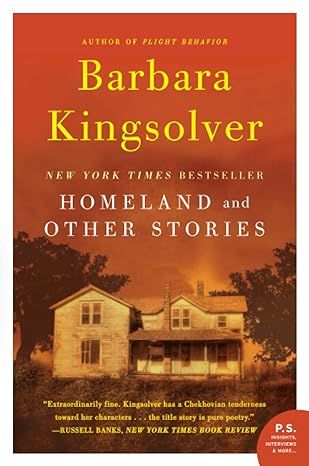
Homeland: And Other Stories
4.2
-
691
$5.24

Animal, Vegetable, Miracle: Our Year of Seasonal Eating
4.5
-
2,496
$7.96

Animal Dreams: A Novel
4.4
-
2,888
$10.49
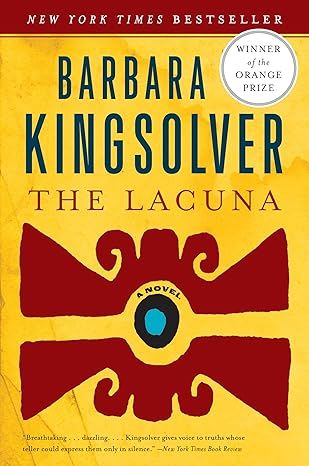
The Lacuna: A Novel (P.S.)
4.4
-
4,450
$1.77
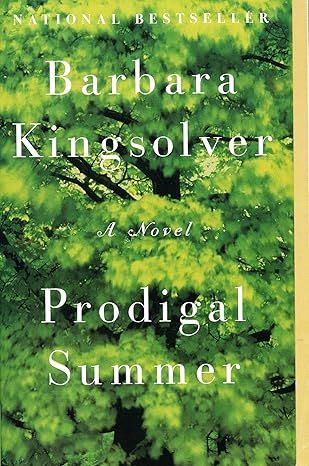
Prodigal Summer: A Novel
4.4
-
6,309
$8.99
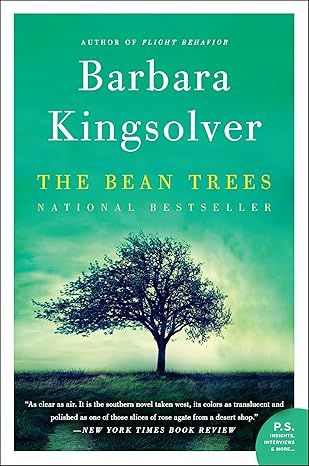
The Bean Trees Anniversary Edition: A Novel
4.4
-
11,504
$2.41
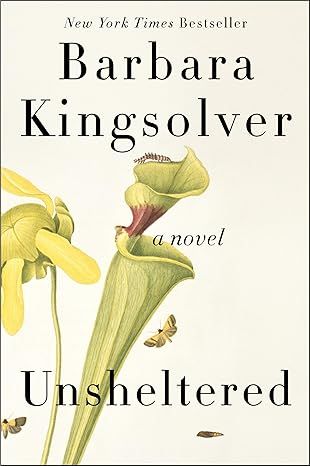
Unsheltered: A Novel
4.2
-
12,750
$5.24

Flight Behavior: A Novel
4.3
-
9,479
$1.84
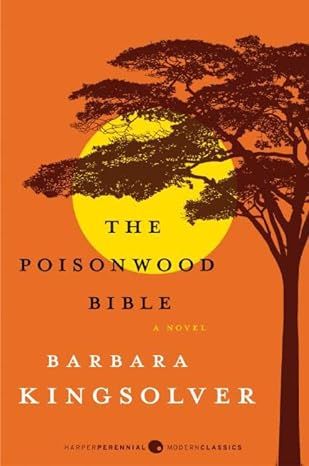
The Poisonwood Bible: A Novel
4.5
-
16,256
$12.69
Best Sellers

The Tuscan Child
4.2
-
100,022
$8.39

The Thursday Murder Club: A Novel (A Thursday Murder Club Mystery)
4.3
-
155,575
$6.33

Sapiens: A Brief History of Humankind
4.6
-
140,302
$13.49

The Butterfly Garden (The Collector, 1)
4.3
-
88,556
$9.59

Things We Hide from the Light (Knockemout Series, 2)
4.4
-
94,890
$11.66

The Last Thing He Told Me: A Novel
4.3
-
154,085
$2.99

The Perfect Marriage: A Completely Gripping Psychological Suspense
4.3
-
143,196
$9.47

The Coworker
4.1
-
80,003
$13.48

First Lie Wins: A Novel (Random House Large Print)
4.3
-
54,062
$14.99

Mile High (Windy City Series Book 1)
4.4
-
59,745
$16.19

Layla
4.2
-
107,613
$8.99

The Locked Door
4.4
-
94,673
$8.53
